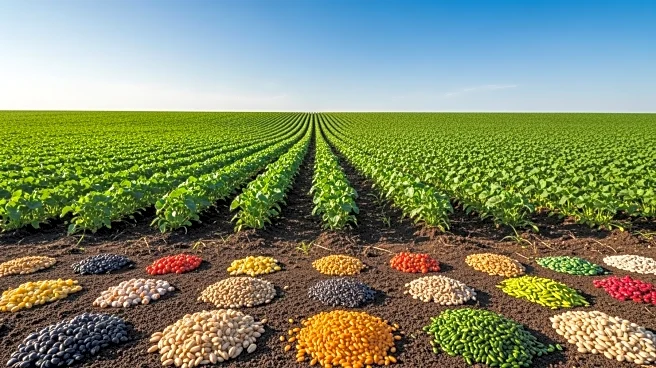What's Happening?
Gujarat State Seed Corporation has achieved significant growth in seed production, reaching 3.68 lakh quintals in 2024-25. This marks an increase of 1.30 lakh quintals over two years. The corporation aims to produce 3.75 lakh quintals in 2025-26 and distribute over 4 lakh quintals annually by 2030. The corporation produces more than 125 varieties across 24 major crops, ensuring a diverse range of seeds suitable for various agro-climatic conditions. Agriculture Minister Raghavji Patel attributes this success to strategic leadership and collaborative efforts under Chief Minister Bhupendra Patel.
Why It's Important?
The expansion in seed production and distribution by Gujarat State Seed Corporation is crucial for enhancing agricultural productivity in the region. By providing high-quality seeds at reasonable prices, the corporation supports farmers in improving crop yields, which can lead to increased incomes and economic stability. The focus on diverse seed varieties also ensures adaptability to different environmental conditions, promoting sustainable farming practices. This growth aligns with broader agricultural development goals, potentially setting a model for other regions.
What's Next?
The corporation plans to continue expanding its production and distribution capabilities, aiming to reach the target of 4 lakh quintals annually by 2030. This involves enhancing its network of authorized seed dealers and collaborating with agricultural universities and research institutions to promote new seed varieties. The corporation's efforts are expected to boost the Varietal Replacement Rate and Seed Replacement Ratio, ensuring farmers have access to higher-yielding, disease-resistant seeds.
Beyond the Headlines
The corporation's emphasis on scientific monitoring and certification of seeds highlights the importance of quality assurance in agricultural production. By collaborating with progressive farmers and utilizing a wide distribution network, the corporation ensures that even farmers in remote areas can access quality seeds. This approach not only supports local agricultural growth but also contributes to broader food security and economic development goals.










